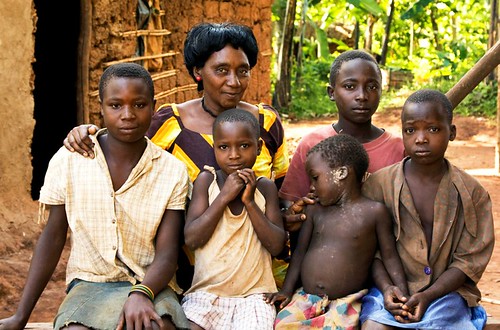It is winter now in Uganda. Winds sweep massive dark clouds along the low cerulean horizon, gusts stir light plastic bags and wrappers, floating them gently through the air as leaves overhead rustle and women pull their blown shawls closer to their shoulders. Fortunate children wear their school sweaters over their uniforms, v-necks in solid colors. It's autumnish. At times blustery.
Long sleeved shirts still hang in my closet, neat and unworn; it’s still too hot for me to cover up. Here it is winter, but it’s tropical winter; reminiscent of a seasonal fall, but the underlying humidity and heat remains. My arms and legs still stick together from perspiration, my tank top and shorts still damp with persistent sweat.
With the coolness and storms comes coughs and sniffles. I am fighting a chest cold as are each one of the children. They pass viruses between each other constantly, from the little ones to the older ones to their school friends and back again, but the winter ushers in stronger strains of sick that rattle little bodies longer and harder, and the rainy season also brings more malaria.
Right now Agnes has it. She got treatment yesterday. Rachel had it a few weeks ago, but is fine now, although she burst open her chin again yesterday running at school and falling on a bench and paid yet another visit to the hospital. I think that is number five for her in the past month.
And yesterday Sylvia had a follow up test for the malaria and typhoid she was being treated for last week; malaria gone, typhoid still there, so back on the white capsules she goes.
“Sylvia. Do you know why you had to get injections and have to take pills?” I ask the little one so completely terrified of needles. When they inject her buttocks, tears pour down her scarlet puffy face and she screams OOOHHH-WEEEE! OOOHHH-WEEEEE!
Her eyes wide, she shakes her head.
“You had to get an injection because you have typhoid. Do you know how you got typhoid?” She tilts her head not sure how to answer. “You got typhoid because you drink dirty water. Remember Mommy told you not to drink dirty water? You only drink water that has been boiled. You don’t drink water out of the jerrycan.” I knew the girl drank unclean water at times; she had reached for the yellow container of well water once in front of me to pout into her cup.
“Did all of you hear that? You don’t drink dirty water if you don’t want to get sick, if you don’t want injections. And typhoid is very dangerous. Sylvia could be much sicker than she is,” I lecture all six kids one afternoon at their house, looking carefully at their faces making sure they are getting me. They are about to eat. I watch Agnes dish posho and beans into wet bowls.
“And you dry the bowls and silver wear before you use it. You pour food into a bowl still wet with dirty water or use a spoon that has dirty water on it, you can get typhoid.” I turn to look at Aggie to see if this makes sense to her. Her eyes seem bright, she nods her head. What we take for granted not growing up poor and ignorant in the village, I think.
Beatrice has managed, despite the weather and her poor hygienic habits, to avoid typhoid and malaria and is doing okay, except for congestion in her chest and fungus on her head. The telling light patch emerged on her shorn scalp the week before last, but will take the treatment of an oral tablet and topical ointment for another week. B2 is not alone in contracting a moldy scalp; discolored heads are commonplace in Uganda with parents maybe not having the money or the patience for the Western medications, so local herbs and remedies are often administered, which are only marginally helpful.
Richard has dodged ailments of all kinds, but still suffers with the leg. Calls and meetings with the surgeon at the charity hospital has us still waiting in purgatory; no we are still not sure if we will have all the instruments we need for him. Mobilizing for Plan B, I will be taking him to a hospital in Kampala next week to meet with doctors who can perform the surgery. In the meantime, a swab of the wound showed the bacteria only sensitive to Cirpro, so Richard takes a large white pill each morning and evening to combat the infection.
The kids' medications are purchased and administered with extreme caution. There are no safe-guards here; nothing in place it seems to protect people from unscrupulous dealers in medicine. I learned the tricks of the trade quickly; how to create one’s own African medical insurance.
“Let me see the dates,” I always ask the pharmacists before they sweep the tablets and pills from the large container into the customer-sized white paper sachets (child-proof plastic containers with medical warnings and labels a world away). Expired medications linger on shelves like mosquitoes on curtains. I check the dates on the bulky jars. I check where the meds are made. India’s okay. China, no way. On the paper packets of pills, I write the patient’s name and times to be administered: Sylvia, 8am, 4pm, 12am; Richard, 7am, 7pm; Beatrice, 8am, 4pm, 12am; Sylvia, 6am, 12pm, 6pm, 12am…. And on and on.







No comments:
Post a Comment